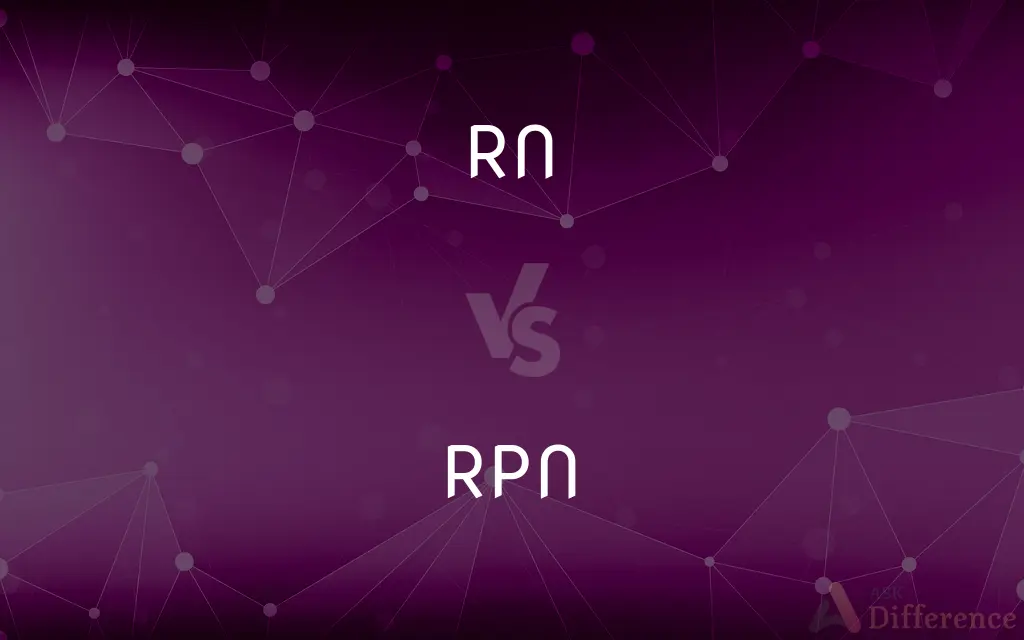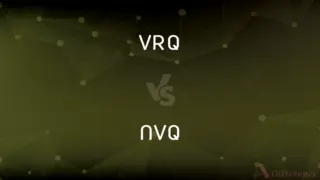RN vs. RPN — What's the Difference?
By Fiza Rafique & Maham Liaqat — Published on March 7, 2024
Registered Nurses (RN) hold a degree in nursing, providing comprehensive care and support in various healthcare settings. Registered Practical Nurses (RPN), typically have a diploma and offer basic nursing care under the supervision of RNs or physicians.

Difference Between RN and RPN
Table of Contents
ADVERTISEMENT
Key Differences
RN and RPN are both crucial roles within the healthcare system, differing mainly in education, scope of practice, and responsibilities. RNs, with a Bachelor of Science in Nursing (BSN) degree, are trained for a wide range of medical duties, including diagnosing and treating conditions, administering medication, and performing diagnostic tests. They work in diverse settings like hospitals, clinics, and community health organizations, often taking on leadership roles in patient care plans.
RPNs or LPNs, holding a diploma from a vocational school or community college, focus on providing basic care, monitoring patients' health, administering medications and injections, and assisting with daily living activities. They work under the direction of RNs and doctors, primarily in settings like long-term care facilities, rehabilitation centers, and some hospital departments.
The educational path for RNs typically takes 4 years, covering a broad spectrum of medical knowledge, leadership, and specialized care. RPNs/LPNs can enter the workforce sooner, usually within 1-2 years of study, focusing on practical nursing skills and patient care basics.
Scope of practice is another key difference; RNs have a broader and more autonomous role, often involving complex decision-making and patient management. RPNs/LPNs have a more focused scope, concentrating on direct patient care and routine procedures.
Despite these differences, both RNs and RPNs/LPNs are essential, working together to provide comprehensive care. Their roles complement each other, ensuring that patients receive the appropriate level of nursing care for their needs.
ADVERTISEMENT
Comparison Chart
Education
Bachelor's degree (4 years)
Diploma (1-2 years)
Scope of Practice
Broad, including diagnosis, treatment, and leadership
Focused on basic care and support under supervision
Responsibilities
Advanced medical procedures, patient care plans, leadership roles
Basic care, monitoring patient health, assisting with daily activities
Work Settings
Hospitals, clinics, community health, leadership positions
Long-term care, rehabilitation centers, some hospital departments
Supervision
Can work independently or supervise LPNs/RPNs and aides
Works under the supervision of RNs and physicians
Compare with Definitions
RN
Often takes leadership roles in healthcare teams.
The RN led a team of nurses to improve patient care protocols.
RPN
Primarily employed in long-term care and rehabilitation.
An RPN provided care in a rehabilitation center for post-operative patients.
RN
Performs diagnostic tests and administers medications.
An RN administered chemotherapy to a cancer patient.
RPN
Offers basic nursing care like monitoring health and administering medications.
The LPN checked vital signs and administered prescribed medications.
RN
Holds a Bachelor of Science in Nursing degree.
She completed her BSN program and passed the NCLEX-RN to become an RN.
RPN
Assists patients with daily living activities.
An RPN helped patients with mobility and personal hygiene.
RN
Provides comprehensive patient care and support across healthcare settings.
The RN developed a care plan for a patient with diabetes.
RPN
Works under RNs and physicians' supervision.
The LPN worked alongside an RN to provide patient care in a long-term care facility.
RN
Works in diverse healthcare environments.
An RN provided critical care in the hospital's intensive care unit.
RPN
Holds a diploma in practical nursing.
He graduated from a 12-month LPN program and passed the NCLEX-PN.
RN
The symbol for the chemical element radon.
RN
A radioactive gaseous element formed by the disintegration of radium; the heaviest of the inert gasses; occurs naturally (especially in areas over granite) and is considered a hazard to health
RN
A graduate nurse who has passed examinations for registration
Common Curiosities
What is the main difference between an RN and an RPN/LPN?
The main difference lies in their education, scope of practice, and responsibilities, with RNs having a broader scope and more advanced duties.
Where do RNs typically work?
RNs work in a variety of settings, including hospitals, clinics, community health organizations, and in leadership positions.
What are the educational requirements for RNs and RPNs/LPNs?
RNs require a Bachelor's degree in nursing, while RPNs/LPNs need a diploma in practical nursing.
Can RPNs/LPNs become RNs?
Yes, RPNs/LPNs can become RNs through bridge programs that build on their existing knowledge and skills.
Can an RPN/LPN administer medication?
Yes, RPNs/LPNs can administer medications and perform injections under the supervision of an RN or physician.
Are there differences in licensure exams for RNs and RPNs/LPNs?
Yes, RNs take the NCLEX-RN, while RPNs/LPNs take the NCLEX-PN, each tailored to the specific scope of practice.
How does the scope of practice vary between RNs and RPNs/LPNs?
RNs have a broader scope, capable of independent decision-making and complex care, while RPNs/LPNs focus on basic care under supervision.
What career advancement opportunities exist for RPNs/LPNs?
RPNs/LPNs can advance by specializing in areas like gerontology, wound care, or through further education to become RNs.
What kind of leadership roles can RNs hold?
RNs can hold leadership roles such as nurse managers, clinical leaders, and healthcare administrators.
How do RNs and RPNs/LPNs work together in healthcare settings?
They work collaboratively, with RNs often supervising RPNs/LPNs, to provide comprehensive patient care across various settings.
Share Your Discovery

Previous Comparison
Greenhouse Effect vs. Global Warming
Next Comparison
VRQ vs. NVQAuthor Spotlight
Written by
Fiza RafiqueFiza Rafique is a skilled content writer at AskDifference.com, where she meticulously refines and enhances written pieces. Drawing from her vast editorial expertise, Fiza ensures clarity, accuracy, and precision in every article. Passionate about language, she continually seeks to elevate the quality of content for readers worldwide.
Co-written by
Maham Liaqat















































